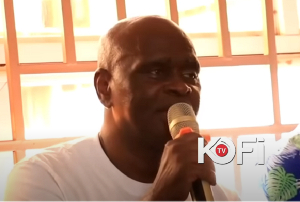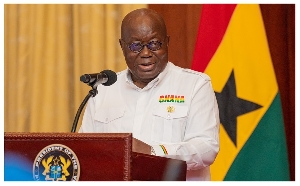- Home - News
- TWI News | TV
- Polls
- Year In Review
- News Archive
- Crime & Punishment
- Politics
- Regional
- Editorial
- Health
- Ghanaians Abroad
- Tabloid
- Africa
- Religion
- Election 2020
- Coronavirus
- News Videos | TV
- Photo Archives
- News Headlines
- Press Release
General News of Wednesday, 29 June 2005
Source: GNA
Laws not panacea to solving all problems- Baah-Wiredu
Accra, June 29, GNA - Finance Minister, Mr Kwadwo Baah-Wiredu on Wednesday said laws were not entirely the panacea to solving all problems but they were rather to mitigate the effects of problems.
He asked Ghanaians to work within the legal, institutional framework and in the best interest of the nation to move her forward. Mr Baah-Wiredu was explaining the nitty-gritty of the Procurement Act at a forum organized by the Ghana-German Economic Association (GGEA) on Act on its Prospects and Challenges.
The Minister, who delivered a paper on the New Development in the Public Procurement Act 2003 said the Act had decentralized procurement and that accountability for procurement now rested on the Head of an Institutions whose decisions rested on a corporate one.
He noted that anyone who tendered for a bid could also seek review of a procurement decision by lodging a complaint to the entity and that if complaints were not resolved satisfactorily the appropriate review board and the Public Procurement Board (PPB) could conduct administrative review.
The PPB, he said, might also allow an institution to use an established private or commercial sector procedure where it deemed it fit.
The Minister said new implementation tools required that all entities were mandated to complete the preparation of their procurement plans at least one month before the end of the financial year after and its approval plans should be updated and reviewed on quarterly basis.
He said that would assist the Finance Ministry to effectively manage expenditure and release cash efficiently.
Mr. Kwesi Abbey Sam, Chairman PPB in his presentation on the Procurement Process and the role of the Board noted that the key functions were in the areas of policy and regulatory machinery, training and capacity building, providing the database and oversight and monitoring, among other activities. The functions were to ensure that the public procurement were carried out in a fair, transparent and non-discriminatory manner using state resources in a judicious economic and efficient way.
Mr Charles Eghan, Country Senior Partner, Pricewaterhouse and Coppers in his presentation on Opportunities and Challenges in the Procurement Act said the laws as many others might have flaws which could be improved upon but also presented opportunities that the private sector could take advantage of. He mentioned some as participation of relevant professionals in the areas of tender evaluation and review, training and capacity building of procurement entities and other areas where the Act did not allow entities to divide procurement order into parts or lower the value.
The private sector was yet to fully understand and appreciate the Act and stakeholders in the sector need to read and hold workshops that would make them conversant with the Act build their capacities as well. Mr Daniel Batidam, Executive Secretary, Ghana Transparency Initiative (GTI) said the Act could not be the panacea in itself against public corruption but that it could give its blessing in the form of government procurement policy guidelines, outlining the most important areas of a properly prepared Public Procurement Manual by true and core professionals in public procurement.
He recommended that government should hire true and correct procurement professionally trained and skilled personnel in core procurement supply material management practices and procedures. He further called for hired experts to conduct proper survey, propose reforms based on facts and prepare a manual out of which the right, workable and dependable amendment to the Act would be promulgated to satisfy the ultimate objective. 29 June 05
Entertainment









